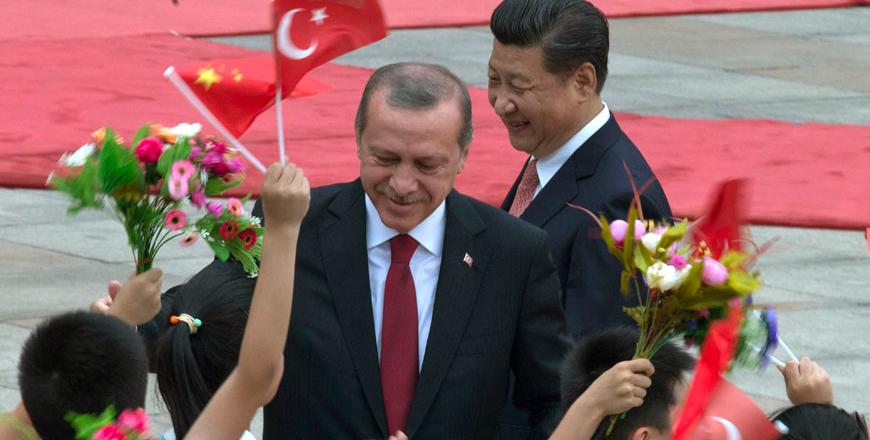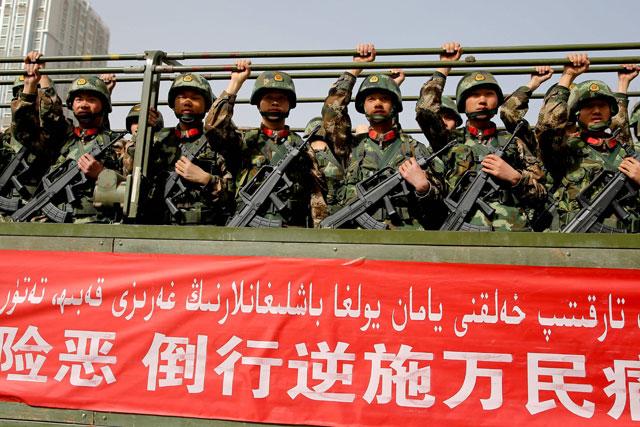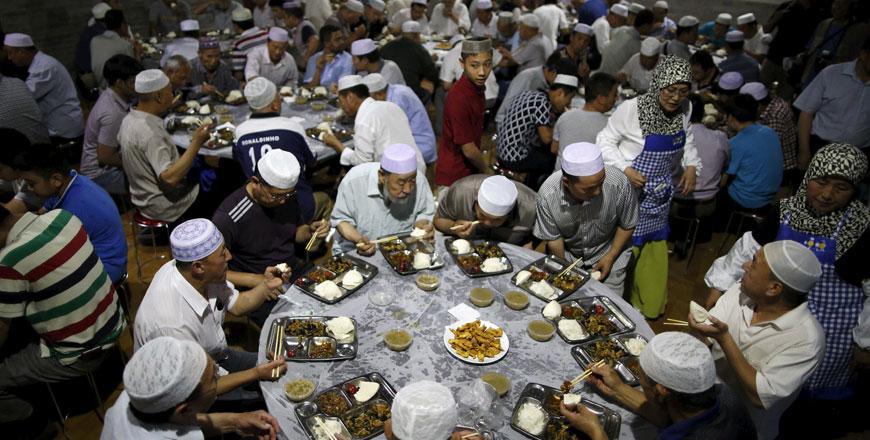You are here
Turkey’s Erdogan, China’s Xi meet amid Uighur strains
By AFP - Jul 29,2015 - Last updated at Jul 29,2015

Turkey’s President Recep Tayyip Erdogan (centre) and Chinese President Xi Jinping (right) are greeted by Chinese children jumping and waving Turkish and Chinese national flags during a welcome ceremony at the Great Hall of the People in Beijing on Wednesday (AP photo)
BEIJING —Turkish President Recep Tayyip Erdogan held talks with his Chinese counterpart Xi Jinping on Wednesday, with a Beijing official saying that the two sides will enhance cooperation in battling "terrorism".
Xi welcomed Erdogan outside Beijing's Great Hall of the People where the two leaders inspected an honour guard before entering the ornate building, a day after Ankara secured NATO's backing for its fight against Daesh militants.
"At present we are moving in a constructive direction bringing more content to our strategic cooperative relationship," Erdogan told Xi.
"We consistently advocate that China and Turkey should support each other on major issues and deepen their strategic cooperative relationship," Xi said.
Erdogan's Turkey is expanding a cross-border campaign against the Daesh group in Syria and also attacking positions of the outlawed Kurdistan Workers' Party in northern Iraq, after deadly attacks inside Turkey.
Turkey is a member of the North Atlantic Treaty Organisation (NATO) and on Tuesday the alliance strongly backed the country's fight against Daesh at an emergency meeting.
Some NATO members, however, expressed concerns that strikes on Kurdish fighters could torpedo peace talks with the rebels, who are bitterly opposed to the jihadists.
Chinese vice foreign minister Zhang Ming told reporters after the Xi-Erdogan talks, which lasted in excess of two hours, that China and Turkey are in step on the issue of terror threats.
"The two countries agree that terrorism is the common enemy of humankind and China and Turkey are both victims of terrorism," he said, adding they "will therefore strengthen cooperation" against it.
The apparently amicable visit follows bilateral tensions regarding the mostly Muslim Uighur minority in China's far west Xinjiang, who have cultural ties with Turkey and speak a Turkic language.
Beijing blames unrest in the area on Islamist separatists seeking independence for the region, while Turkey has repeatedly expressed concerns about Beijing's treatment of the minority — with Erdogan in 2009 even accusing Beijing of "genocide" in the region.
'Poison ties'
The two countries have engaged in a public row this year over Uighurs who fled China to seek refuge in Thailand, with Turkey offering them shelter against Beijing's wishes.
Thailand said this month that it had deported about 100 Uighurs back to China, after sending more than 170 Uighur women and children to Turkey in late June.
As tensions over the refugees mounted, activists stormed the Thai consulate in Istanbul and burnt the Chinese flag outside Beijing's consulate in the city. China "strongly condemned" the acts.
The state-run China Daily newspaper warned in a Wednesday editorial that the "Uighur issue... if left unattended, may poison ties and derail cooperation."
Chinese media have repeatedly cited unnamed sources linking Uighurs to jihadist violence in the Middle East, without giving evidence.
On Wednesday, a court in Indonesia jailed a Uighur for six years after he was caught trying to join an Islamist extremist group led by the Southeast Asian country's most wanted militant.
Beijing claims that Uighurs are being radicalised by exposure to the shadowy East Turkestan Islamic Movement (ETIM) and that it has played a role in attacks in Xinjiang, which has suffered deadly unrest, and in other parts of China.
But many overseas experts doubt ETIM's strength and links to global terrorism, with some saying China exaggerates the threat of a Xinjiang independence movement to justify tough security measures there.
"Turkey regards the ETIM as a terrorist organisation and Turkey will not allow anyone to use Turkey's territory to do anything to harm China's national interests and security," Zhang said.
As part of a clampdown in Xinjiang, Chinese authorities have also launched campaigns against the wearing of headscarves, veils and other Islamic coverings by women and facial hair on men while also banning civil servants, students and teachers there from fasting during the holy month of Ramadan.
At the welcome ceremony, Erdogan's wife Emine was shown in footage on state TV wearing a hijab when being greeted by Xi and his spouse Peng Liyuan.
Turkey has expressed interest in Chinese defence technology and entered discussions in 2013 with a state-run company over a contract for an anti-missile system worth $3.4 billion, raising eyebrows among other NATO members.
A final deal has been elusive, with Erdogan noting in an interview with China's state-run Xinhua news agency that "impediments" have emerged after an initial Chinese proposal, but also said that the issue would be on the agenda in Beijing.
Xi and Erdogan presided over the signing of three agreements, including promoting and protecting investment and a trade development plan, but no concrete details on progress on the anti-missile deal emerged.
Zhang said only that the countries "have strong interests in defence cooperation and will strengthen cooperation in this area".
Erdogan is due to visit Indonesia after leaving China, the Turkish government said.
Related Articles
BEIJING — Vowing to plant their flag in China and that blood will "flow in rivers", a video released this week purportedly by the Daesh terr
BEIJING/ISTANBUL — China has warned its citizens travelling in Turkey to be careful of anti-Beijing protests, saying some Chinese tourists h
BEIJING — China has banned civil servants, students and teachers in its mainly Muslim Xinjiang region from fasting during Ramadan and ordere
















